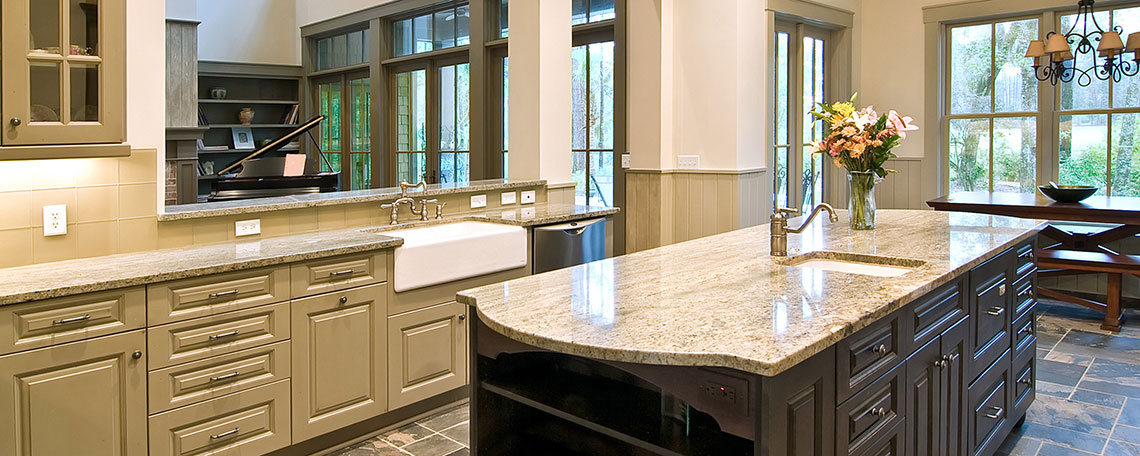
Quartz surfaces are easy to maintain. It is a non-porous material that is highly resistant to stain, scratches and heat. However, it is not stain, scratch, or heat proof.
Follow the proper care and maintenance recommended by your professional distributor or installer to keep the surface beautiful for many years.
Routine Care & Maintenance
Simply clean with soap and water on a regular basis to keep the lustrous gloss and radiant sheen. Use warm water and a damp cloth with a small amount of non-abrasive cleaner that does not contain bleach.
Although Quartz surfaces are resistant to stain, spills should be cleaned as soon as possible. Liquid spills and stains from fruits, vegetables, or other foods should be wiped up and cleaned with soap and water.
Preventing Damages
Heat
Quartz surfaces are designed to be resistant to heat and can withstand exposure to normal cooking environment for brief periods of time without being damaged. Although Quartz surfaces withstands heat better than most surfacing materials on the market, all surfacing materials, including stone, can be damaged by extreme temperature changes, whether prolonged or sudden. Trivets and hot pads should always be used when placing hot skillets, pans, crock-pots or other heat generating kitchenware on the surface.
Scratches
Quartz’s durable surface is designed to withstand normal use. While it is resistant to scratches, cuts, and chipping, cutting directly on the quartz surface should be avoided. Using cutting boards and taking care not to drop or move heavy objects on the surface will help to ensure long-lasting beauty.
Chemical
Avoid exposing Quartz surfaces to any strong chemicals and solvents. It is important to note that some of these chemicals and solvents can be found in household items like paint removers, paint and stain strippers that contain trichlorethane or methylene chloride, nail polish removers, bleach, furniture cleaners, oil soaps, permanent markers or inks, and chemicals with high alkaline/PH levels (oven cleaners, drain openers, etc.). Avoid using cleaning products that contain oils, powders or abrasives.
Although long-term or frequent exposure must be avoided at all times, the following products may be used with short-term exposure (removing and rinsing immediately after application with water) to clean difficult stains or residues. Always handle such cleaning agents with care and rinse the applied surface with water completely afterwards.
Recommended cleaners:
- Simple Green
- 10x Stone Polish
- Magic Eraser by Mr. Clean
- Soap and Water
- Denatured Alcohol
- Hopes Surface cleaner
- Rock Doctor cleaner
**All products must have all excess removed immediately after application with water and cloth. Prolonged exposure may ruin the surface of the slab.**
Chemicals to Avoid
The below list of chemicals should be avoided with Quartz surfaces; however, the below list is not a complete list, and there may be other chemicals not listed here that may damage the surface. The effect of any chemical usage on Quartz surfaces are ultimately dependent on the type of chemical, the length of exposure, and the degree of concentration.
- Oil soaps, bluing agents, dyes, stains, paint thinner or strippers.
- Solvents such as acetone, nail polish remover, lacquer thinner, or bleach (short-term exposure at 50% dilution may be acceptable for purpose of cleaning difficult stains-based on removing and rinsing applied area immediately).
- Chlorinated solvents such as trichloroethylene or methylene chloride
- Benzene, toluene, methyl ethyl ketone
- Concentrated acids such as hydrocyanic acid, hydrofluoric acid, hydrochloric acid, sulfuric acid, nitric acid.
- Chemicals with high alkaline/PH levels (pH > 10)
**If any of the substance listed come into contact with the Quartz surface, rinse with plenty of water and follow routine cleaning procedures immediately.
Removing Difficult Spills
On stubborn or dried spills where routine cleaning procedures do not work, use a non-abrasive cleaning pad along with the following recommended cleaners:
Recommended cleaners:
- Simple Green
- 10x Stone Polish
- Magic Eraser by Mr. Clean
- Soap and Water
- Denatured Alcohol
- Hopes Surface cleaner
- Rock Doctor cleaner
If gum, nail polish, paint, or other substances are accidentally allowed to adhere to the surface, they can be removed with the use of a plastic scraper or putty knife to gently scrape off the substance and by following routine cleaning procedures.